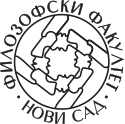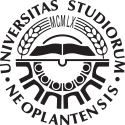15MKMK026 - World Literature 2
| Course specification | ||||
|---|---|---|---|---|
| Course title | World Literature 2 | |||
| Acronym | 15MKMK026 | |||
| Study programme | Hungarian language and literature | |||
| Module | ||||
| Type of study | first degree undergraduate academic studies | |||
| Lecturer (for classes) | ||||
| Lecturer/Associate (for practice) | ||||
| Lecturer/Associate (for OTC) | ||||
| ESPB | 6.0 | Status | ||
| Condition | None. | Oblik uslovljenosti | ||
| The goal | Acquainting the students with the history of world literature from the Renaissance until the end of the 20th century, highlighting the thematic-motive, genre-poetic points of main emphasis, developing skills necessary for textual analysis and placing the work into an adequate context. | |||
| The outcome | Gained knowledge on world literature from the Renaissance until the end of the 20th century, with the ability to recognize thematic-motive, genre-poetic emphasis points, developed skills for textual analysis and putting the work into an adequate context. | |||
| Contents | ||||
| Contents of lectures | Theoretical lectures: The concept of renaissance. Renaissance in Italy. Bocaccio. Renaissance in France. Rabelais. Montaigne. Renaissance in Spain. Cervantes. Classicism and rococo. Diderot, Voltaire, Rousseau. Pre-romanticism. English novel: Swift, Defoe, Stern, Fielding. Literature of realism and naturalism. Flaubert. Russian realism. Dostoevsky. The poetic school of symbolism. Baudelaire. New prose: Musil, Woolf. Existentialistic novel. Sartre, Camus. | |||
| Contents of exercises | Practical lectures: interactive work analysis, writing exercises, essays. | |||
| Literature | ||||
| ||||
| Number of hours per week during the semester/trimester/year | ||||
| Lectures | Exercises | OTC | Study and Research | Other classes |
| 2 | 1 | |||
| Methods of teaching | Monological, dialogical, interactive, oral, written. Lectures, presentations, interactive analysis of works, discussion, developing writing skills, consultation. | |||
| Knowledge score (maximum points 100) | ||||
| Pre obligations | Points | Final exam | Points | |
| Activites during lectures | 10 | Test paper | 0 | |
| Practical lessons | 20 | Oral examination | 70 | |
| Projects | ||||
| Colloquia | ||||
| Seminars | ||||

